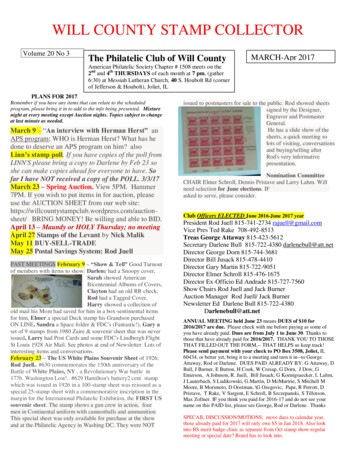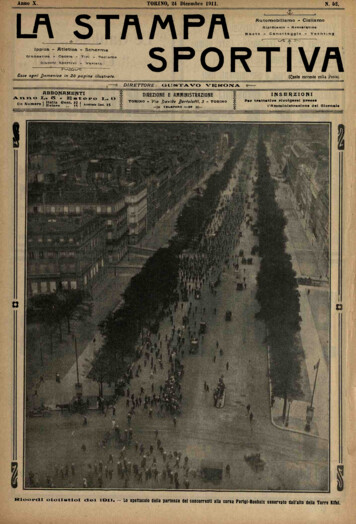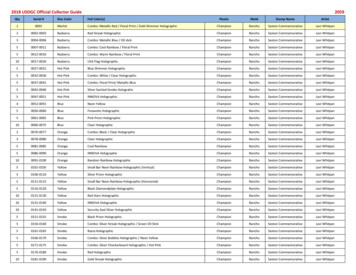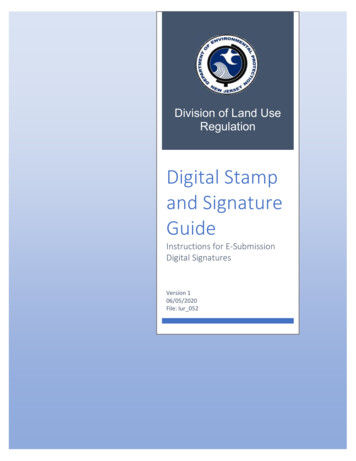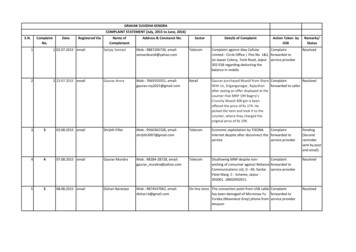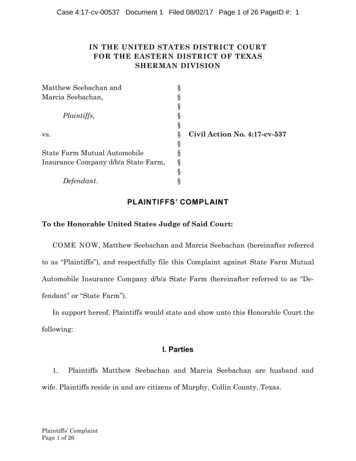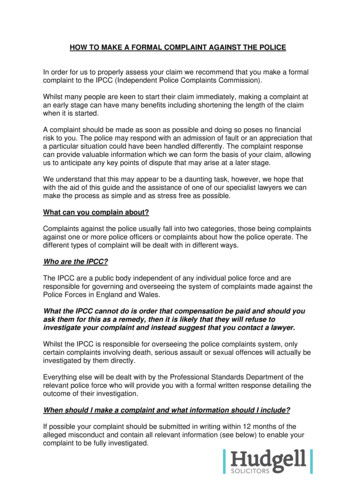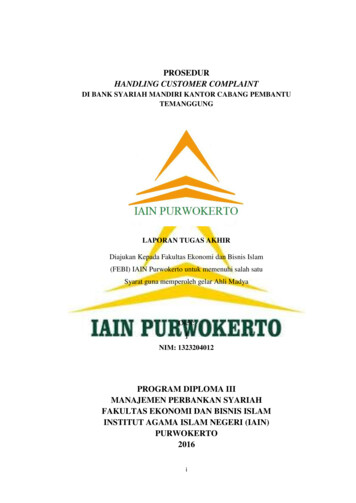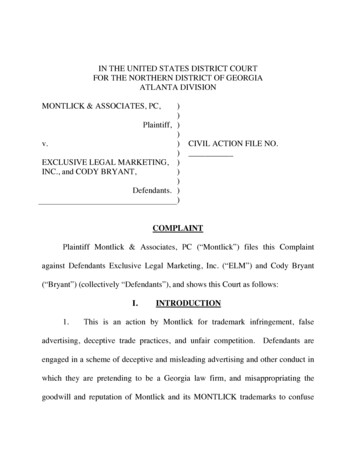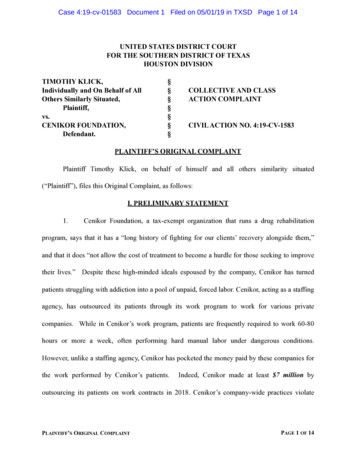
Transcription
Case 4:19-cv-01583 Document 1 Filed on 05/01/19 in TXSD Page 1 of 14UNITED STATES DISTRICT COURTFOR THE SOUTHERN DISTRICT OF TEXASHOUSTON DIVISIONTIMOTHY KLICK,Individually and On Behalf of AllOthers Similarly Situated,Plaintiff,vs.CENIKOR FOUNDATION,Defendant.§§§§§§§COLLECTIVE AND CLASSACTION COMPLAINTCIVIL ACTION NO. 4:19-CV-1583PLAINTIFF’S ORIGINAL COMPLAINTPlaintiff Timothy Klick, on behalf of himself and all others similarity situated(“Plaintiff”), files this Original Complaint, as follows:I. PRELIMINARY STATEMENT1.Cenikor Foundation, a tax-exempt organization that runs a drug rehabilitationprogram, says that it has a “long history of fighting for our clients’ recovery alongside them,”and that it does “not allow the cost of treatment to become a hurdle for those seeking to improvetheir lives.” Despite these high-minded ideals espoused by the company, Cenikor has turnedpatients struggling with addiction into a pool of unpaid, forced labor. Cenikor, acting as a staffingagency, has outsourced its patients through its work program to work for various privatecompanies. While in Cenikor’s work program, patients are frequently required to work 60-80hours or more a week, often performing hard manual labor under dangerous conditions.However, unlike a staffing agency, Cenikor has pocketed the money paid by these companies forthe work performed by Cenikor’s patients.Indeed, Cenikor made at least 7 million byoutsourcing its patients on work contracts in 2018. Cenikor’s company-wide practices violatePLAINTIFF’S ORIGINAL COMPLAINTPAGE 1! OF 14!
Case 4:19-cv-01583 Document 1 Filed on 05/01/19 in TXSD Page 2 of 14both the minimum wage and overtime requirements of the Fair Labor Standards Act, as well asTexas common law and the Trafficking Victims Protection Act of 2000 (the “TVPA”).Plaintiff, on behalf of himself and all others similarly situated, brings this2.collective action to recover minimum wage and overtime compensation and all other availableremedies under the Fair Labor Standards Act of 1938, as amended, 29 U.S.C. 201 et. seq. (the“FLSA”). Plaintiff also asserts individual and class claims of quantum meruit/unjust enrichmentand violations of the TVPA.3.This collective and class action consists of all individuals who participated in anywork programs at the direction of Cenikor Foundation.4.For at least three years prior to the filing of this Complaint, Defendant willfullycommitted widespread violations of the FLSA by failing to pay these employees for overtimehours worked in excess of forty hours per week at a rate of one and one-half times their regularrate of pay.II. PARTIES5.Plaintiff is an individual who was formerly employed by Defendant.Plaintiff’sNotice of Consent is attached hereto as Exhibit 1.6.Cenikor Foundation is a domestic nonprofit corporation. Cenikor may be servedthrough its registered agent for service of process in Texas, Bill Bailey, 11931 Wickchester Ln,Ste. 300, Houston, TX 77043III. JURISDICTION AND VENUE7.This Court has subject matter jurisdiction under 28 U.S.C. § 1331 because thiscivil action arises under the Constitution, laws, or treaties of the United States; specifically, thePLAINTIFF’S ORIGINAL COMPLAINTPAGE 2! OF 14!
Case 4:19-cv-01583 Document 1 Filed on 05/01/19 in TXSD Page 3 of 14Fair Labor Standards Act of 1938, as amended, 29 U.S.C. § 201 et. seq. Jurisdiction is furtherconferred on this Court by the provisions of 28 U.S.C. § 1337 relating to “any civil action orproceeding arising under any Act of Congress regulating commerce.”8.This Court has personal jurisdiction over Defendant because it is a Texas resident.This Court’s assertion of jurisdiction over Defendants would not offend traditional notions of fairplay and substantial justice.9.Venue is proper in this district pursuant to 28 U.S.C. § 1391(b)(1) because one ofthe Defendants resides in this district and all of the Defendants are residents of the State in whichthis district is located. Venue is also proper in this district pursuant to 28 U.S.C. § 1391(b)(2)because, as provided below, a substantial part of the events or omissions giving rise to this claimoccurred in this judicial district.IV. COVERAGE10.At all relevant times, Defendant has acted, directly or indirectly, as an employeror joint employer with respect to Plaintiff and others similarly situated. Defendant is or wasjointly responsible for all decisions related to the wages to be paid to the Class Members, thework to be performed by the Class Members, the locations of work performed by the ClassMembers, the hours to be worked by the Class Members, and the compensation policies withrespect to the Class Members.11.At all relevant times, Defendant has operated an enterprise within the meaning ofSection 3(r) of the FLSA, 29 U.S.C. § 203(r).12.At all relevant times, Defendant has operated an enterprise engaged in commerceor in the production of goods for commerce within the meaning of Section 3(s)(1) of the FLSA,PLAINTIFF’S ORIGINAL COMPLAINTPAGE 3! OF 14!
Case 4:19-cv-01583 Document 1 Filed on 05/01/19 in TXSD Page 4 of 1429 U.S.C. § 203(s)(1), in that said enterprise has had employees engaged in commerce or in theproduction of goods for commerce, or employees handling, selling, or otherwise working ongoods or materials that have been moved in or produced for commerce by any person and in thatsaid enterprise has had an annual gross sales volume of sales made or business done of not lessthan 500,000.13.At all relevant times, Plaintiff and others similarly situated, were or are employeesfor Defendant who was engaged in commerce or in the production of goods for commerce.V. FACTUAL BACKGROUND14.Cenikor is a tax-exempt organization that holds itself out as a drug rehabilitationprogram.1 However, its work rehabilitation program has been taken to the extreme, as patientsare often required to work 60-80 hours per week if not more. Some of the program's participantsenter the program to comply with a court order. Others enter the program voluntarily. The longworkweeks that Cenikor’s patients are required to endure leave little if any time for them to seekcounseling.Cenikor’s patients are duped into believing that they will receive meaningfultreatment and rehabilitation, only to realize that they are being used as a cheap and expendablelabor pool for Cenikor and the private companies that Cenikor’s patients work for.15. Plaintiff Timothy Klick checked himself into Cenikor’s Fort Worth facility in orabout September of 2018 after hearing what was essentially a sales pitch from one of Cenikor’s“outreach specialists” while at another rehabilitation program.He was not told until he hadchecked in that he would be expected to perform manual labor under unsafe conditions for atleast 40 hours per week and that he would receive no pay for his work. Mr. Klick worked atCenikor is headquartered in Houston. It has “treatment centers” in Austin, Houston, Fort Worth,Killeen, San Marcos, Temple, Tyler, and Waco, Texas, as well as Baton Rouge, Louisiana.1PLAINTIFF’S ORIGINAL COMPLAINTPAGE 4! OF 14!
Case 4:19-cv-01583 Document 1 Filed on 05/01/19 in TXSD Page 5 of 14Thermoserve, a dinnerware manufacturer in Dallas.Thermoserve had at least four Cenikorpatients who worked at least 40 hours per week at its Dallas facility. He and others were toldthat they were expected to work more than 40 hours when Thermoserve got busy, and theysometimes did - sometimes working 10 hour shifts five or six days per week. Thermoserve paidCenikor an unknown hourly rate for each hour that each Cenikor patient worked at its facility.Cenikor did not remit any of this money (or any money at all) to these workers. Mr. Klick quitthe program because he was being exposed to what he believed were dangerous chemicals atThermoserve and because he was not being paid for the long hours he was required to work.216.The work of Plaintiff and the Class Members conferred a direct economic benefitto Cenikor - in 2017 and 2018, the company made more than 7 million from its work programseach year. On information and belief, Cenikor incentivizes its “vocational service managers” tosecure lucrative work contracts - those who do receive bonus payments. Cenikor claims that themoney from the work programs is used to offset the cost of its rehabilitation program. However,food stamps cover meal costs, and for Cenikor’s facilities in Louisiana, Medicaid pays for mostof the counseling and medical costs. According to a report from Reveal News (available didnt-get-paid-a-dime/), “[i]nternal financial ledgers from the program’s BatonRouge facility show that in 2016 and 2017, Cenikor’s job contracts regularly delivered more thantwice as much money as its daily operating expenses.”And while Cenikor’s programOther Class Members have been required to work at oil refineries, chemical plants and other dangerousor hazardous locations, including cleaning flooded homes of black mold and raw sewage. Cenikorprovides those in its program with no job or safety training, and, not surprisingly, on-the-job injuries arerampant. Given the long hours and dangerous conditions endured by Plaintiff and the Class Members,they are fully justified to have expected to be paid for their work.2PLAINTIFF’S ORIGINAL COMPLAINTPAGE 5! OF 14!
Case 4:19-cv-01583 Document 1 Filed on 05/01/19 in TXSD Page 6 of 14participants are supposed to “graduate” in 18 months, fewer than 8 percent of them complete theprogram, according to Cenikor’s own figures.17.Cenikor engages in harsh disciplinary practices in order to keep its patients in fearof being reported to Cenikor by the third party companies. A patient who is removed from his orher job with a private company is “put into assessment.”This means that, in addition toimmediately being assigned to another 40-plus hour-a-week job, for 21 days (or longer), thepatient is required to wash dishes, mop, sweep and perform other menial tasks around theCenikor facility until the facility closes for the night, all while reciting the “Cenikor philosophy.”Other forms of discipline for failing to perform satisfactorily in Cenikor’s work program includebeing forced to stand in a corner in an upright position for long periods of time; sitting in a“verbal chair” in an upright position for long periods of time, and writing the same linesrepeatedly or essays.18.No exemption excuses Defendants from paying Plaintiff and the other ClassMembers minimum wages and/or overtime rates under the FLSA.19.Defendants have failed to make a good faith effort to comply with the FLSA.Instead, Defendants knowingly, willfully or with reckless disregard carried out its illegal patternor practice regarding overtime compensation. Plaintiff and those similarly situated are entitled toliquidated damages for such conduct.20.For purposes of this action, the “relevant period” is defined as such periodcommencing on the date that is three years prior to the filing of this action, and continuingthereafter.PLAINTIFF’S ORIGINAL COMPLAINTPAGE 6! OF 14!
Case 4:19-cv-01583 Document 1 Filed on 05/01/19 in TXSD Page 7 of 1421.Plaintiff has retained the undersigned counsel to represent him and those similarlysituated in this action. Pursuant to the FLSA, Plaintiff and those similarly situated are entitled torecover all reasonable attorney’s fees and costs incurred in this action.VI. COLLECTIVE ACTION ALLEGATIONS22.Other employees of Defendant have been victimized by the pattern, practice andpolicy of Defendants. Plaintiff is aware that the illegal practices and policies of Defendants havebeen imposed on other, similarly situated workers.23.Plaintiff brings his claims on behalf of all current and former Class Members.24.Defendant’s compensation policies and procedures with respect to Plaintiff andthe Class Members and wages paid to Plaintiff and the Class Members are substantially similar,if not identical.25.Defendant’s pattern of failing to pay overtime compensation as required by theFLSA results from Defendant’s general application of compensation policies and procedures, anddoes not depend on individualized circumstances of Plaintiff or the Class Members.26.Although the issue of damages may be individual in character, this does notdetract from the common nucleus of facts with respect to Defendant’s liability under the FLSA.27.Plaintiff files this case as an “opt-in” collective action as specifically allowed by29 U.S.C. § 216(b). Plaintiff brings these claims on his own behalf and on behalf of thosesimilarly situated who have not been fully compensated for all work performed, time spent, andactivities conducted for the benefit of Defendant.28.Plaintiff requests that Defendant identify all prospective members of the proposedclass of Class Members in order that proper notice of their right to consent to participation in thisPLAINTIFF’S ORIGINAL COMPLAINTPAGE 7! OF 14!
Case 4:19-cv-01583 Document 1 Filed on 05/01/19 in TXSD Page 8 of 14collective action may be distributed, including their names, dates of employment, job titles, lastknow addresses, and telephone numbers.29.Plaintiff seeks to represent those members of the above-described group who,after appropriate notice of their ability to opt into this action, have provided consent in writing tobe represented by Plaintiff’s counsel as required by 29 U.S.C. § 216(b).30.Those individuals who choose to opt in will be listed on subsequent pleadings andcopies of the written consents will be incorporated by reference.31.Plaintiff will fairly and adequately represent and protect the interests of thosesimilarly situated who opt into this action.VII.CLASS ACTION ALLEGATIONS32.The foregoing allegations are incorporated herein by reference.33.Plaintiff brings this class action on behalf of the respective Class Members. TheClass Members are so numerous that their joinder is impracticable. While the precise number ofthe Class Members is unknown, there are, on information and belief, more than a thousandindividuals who have participated in Cenikor’s work programs within the past three years alone.34.Plaintiff’s claims are typical of the Class Members.Plaintiff and the ClassMembers (1) participated in Cenikor’s work programs; and (2) were not paid for such work.35.Common questions of law and fact predominate over any questions affecting anyindividual members, including: Whether Cenikor is liable under the Texas cause of action of quantum meruit and/or under the TVPA; The proper measure of damages sustained by the respective Class Members; andPLAINTIFF’S ORIGINAL COMPLAINTPAGE 8! OF 14!
Case 4:19-cv-01583 Document 1 Filed on 05/01/19 in TXSD Page 9 of 14 Whether Cenikor should be ordered to pay restitution and/or whether its revenueshould be disgorged as a result of its conduct.36.As a result, Plaintiff will fairly and adequately protect the respective ClassMembers and has retained counsel experienced in complex wage and hour litigation.37.This action is properly maintainable as a class action under Fed. R. Civ. P. 23(b)(3) because Cenikor acted or refused to act on grounds generally applicable to the Rule 23 ClassMembers, making equitable relief through restitution and/or disgorgement appropriate to theRule 23 Class Members as a whole.38.This action is properly maintainable as a class action under Fed. R. Civ. P. 23(b)(3) because (1) questions or law or fact predominate over any questions affecting individual classmembers; and (2) a class action is superior to other methods to ensure a fair and efficientadjudication of this controversy because the aggrieved individuals lack the financial resources tovigorously prosecute lawsuits against large corporate defendants. Class litigation is also superiorbecause it will preclude the need for unduly duplicative litigation resulting in inconsistentjudgments pertaining to policies and practices, including Cenikor’s work program policies. Noapparent difficulties exist in managing this class action. Plaintiff intends to send notice to theproposed Rule 23 Class Members to the extent required by Fed. R. Civ. 23(c).PLAINTIFF’S ORIGINAL COMPLAINTPAGE 9! OF 14!
Case 4:19-cv-01583 Document 1 Filed on 05/01/19 in TXSD Page 10 of 14VIII. CAUSES OF ACTIONCOUNT ONE - VIOLATIONS OF THE FLSA39.The foregoing allegations are incorporated herein by reference.40.Plaintiff and others similarly situated were or are non-exempt employees ofDefendant.41.Plaintiff and others similarly situated are entitled to be paid the prevailingminimum wage under the Fair Labor Standards Act.42.Plaintiff and others similarly situated are entitled to overtime pay for all hours inexcess of forty worked during each seven-day workweek.43.Defendant violated 29 U.S.C. § 201 et. seq. by failing to pay Plaintiff and otherssimilarly situated the prevailing minimum wage as well as overtime compensation at a rate ofone-and-a-half times the appropriate regular rate.44.In further violation of the FLSA, Defendant failed to maintain accurate employeepay records, including the number of hours worked per workweek by Plaintiff and other similarlysituated employees.45.Plaintiff, individually and on behalf of others similarly situated, seeks all unpaidminimum wages and/or overtime compensation and an additional equal amount as liquidateddamages for a period of three years from the date of the filing of this complaint, as well asreasonable attorney’s fees, costs and litigation expenses, including expert witness fees, asprovided by 29 U.S.C. § 216(b), along with pre- and post-judgment interest at the highest rateallowed by law.PLAINTIFF’S ORIGINAL COMPLAINTPAGE 10! OF 14!
Case 4:19-cv-01583 Document 1 Filed on 05/01/19 in TXSD Page 11 of 14COUNT TWO - QUANTUM MERUIT/UNJUST ENRICHMENT46.The foregoing allegations are incorporated herein by reference.47.Cenikor increased its revenue because Plaintiff and the Class Members performuncompensated or under-compensated labor.48.Plaintiff and the Class Members conferred non-gratuitous benefits upon Cenikorby performing work without compensation, for which Cenikor would otherwise have had to payat least the applicable minimum wage or more, thereby significantly and materially increasingCenikor’s revenue, unjustly enriching Cenikor at the expense of and detriment to Plaintiff andthe Class Members.49.Cenikor’s retention of any benefit collected directly and indirectly from thisuncompensated labor violated principles of justice, equity, and good conscience.50.As a direct and proximate result of Cenikor’s forced labor practices, Plaintiff andthe Class Members have suffered concrete harm and injury, including physical and emotionalinjury, monetary loss, and the unlawful violation of their rights.51.Plaintiff and the Class Members are entitled to recover from Cenikor all amountsthat Cenikor has wrongfully and improperly obtained, and Cenikor should be required todisgorge to Plaintiff and the Class Members the benefits it has unjustly obtained.PLAINTIFF’S ORIGINAL COMPLAINTPAGE !11 OF !14
Case 4:19-cv-01583 Document 1 Filed on 05/01/19 in TXSD Page 12 of 14COUNT THREE - VIOLATIONS OF THE TRAFFICKING VICTIMSPROTECTION ACT OF 200052.The foregoing allegations are incorporated herein by reference.53.Plaintiff and the Class Members are victims of attempted forced labor as definedby 18 U.S.C. § 1589.54.Cenikor attempts to violate 18 U.S.C. § 1589 and 1594 by knowingly maintaininga corporate policy and uniform practice involving its work programs aimed at obtaining nearlyfree labor and services by threatening Plaintiff and the Class Members with physical restraint,serious harm, and abuse of law or legal process if they refuse to provide their labor, organize awork stoppage, or participate in a work stoppage.55.Cenikor attempted to perpetrate the offense of forced labor against Plaintiff andthe Class Members.56.Cenikor knowingly benefitted financially from participation in a venture Cenikorknew or
Cenikor Foundation is a domestic nonprofit corporation. Cenikor may be served . Bill Bailey, 11931 Wickchester Ln, Ste. 300, Houston, TX 77043 III. JURISDICTION AND VENUE 7. This Court has subject matter jurisdiction under 28 U.S.C. § 1331 because this . and Waco

